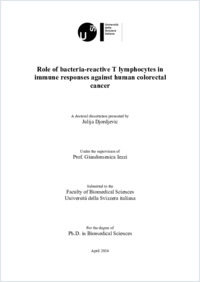Role of bacteria-reactive T lymphocytes in immune responses against human colorectal cancer
- Djordjevic, Julija
- Iezzi, Giandomenica (Degree supervisor)
- 2024
PhD: Università della Svizzera italiana
English
Colorectal cancer (CRC) is the third most diagnosed cancer globally and the second leading cause of cancer-related mortality. Many studies have convincingly demonstrated that CRC infiltration by T cells is unequivocally associated with prolonged patient survival, although this spontaneously occurs in a minority of cases, and underlying mechanisms remain unclear. Paradoxically, immunotherapies based on immunological checkpoint inhibitors (ICIs) have proven beneficial only in a small subset of CRCs (up to 15%), characterized by microsatellite instability (so-called MSI phenotype), high tumor mutational burden (TMB) and high immunogenicity and increased T cell infiltration. Instead, most CRC cases exhibit a microsatellite stable (MSS) phenotype, low mutational burden, and poor response to ICIs. In these CRCs, it has been recognized that only a minor fraction of tumor-infiltrating T cells (TILs) is specific for tumor-derived neoantigens, while a large abundance of TILs is identified as “bystander” cells, with antigenic specificities remaining unclear. CRC originates within an environment teeming with trillions of gut bacteria. During the oncogenic process, changes in gut barrier integrity result in increased permeability of the gut mucosa, thus allowing gut bacteria to actively translocate into the submucosa and directly engage with tumor cells and resident immune cells. Previous studies from our group have revealed significant correlations between the abundance of specific bacterial species within the tumor tissue and the extent of T cell infiltration. Based on this background, in this study, we followed the hypothesis that at least a subset of T cells infiltrating CRC tissues may be specific to previously identified CRC-associated bacteria, and following activation within tumor tissues may exert anti-tumor effects. We aimed to address the following specific points: 1.Testing of the ability of previously identified bacterial strains to induce T cell activation; 2. Characterization of the phenotypic and functional profiles of bacteria-reactive T cells; 3. Evaluation of anti-tumor potential of bacteria-reactive T cells; 4. Identification of bacteria-reactive T cells among TILs in CRC tissue. We found that CRC-associated bacteria induced the expansion of peripheral blood T cells both in healthy donors and CRC patients, to similar extents. Specifically, bacteria-induced expansion was derived from the memory T cell compartment. Surprisingly, the predominant population of proliferating cells was identified as CD4-CD8- (double negative, DN) T cells induced by all three tested bacteria. We showed that bacteria-induced DN T cells possess cytotoxic innate-like properties. Furthermore, we demonstrated their T cell-mediated and cytokine-mediated killing capacity towards tumor cells. Additionally, we detected abundant DN T cell clusters in the analysis of the primary CRC infiltrates. We then employed single-cell RNA sequencing coupled with TCR sequencing of TILs from primary CRCs of five patients and autologous peripheral blood bacteria-reactive T cells, to comparatively assess their functional identities and clonal repertoire. Whole genome transcriptomic analysis revealed high identity matching between DN T cells and CD8+ cells, and high expression of innate receptors NKG2D and DNAM-I. Interestingly, large proportions of the bacteria-expanded cells were identified as unconventional TCRgd or mucosa-associated invariant T (MAIT) cells in these five patients. Further TCR sequencing analysis revealed several dominant clonotypes induced by CRC-associated bacteria, of which some appeared to be cross-reactive to different bacteria. Ultimately, we identified bacteria-specific T cell clonotypes within the TILs. Our findings cumulatively suggest that defined species of CRC-infiltrating bacteria are capable of inducing unconventional DN T cells endowed with cytotoxic anti-tumor properties. These findings may pave the way towards the development of novel therapeutic concepts aimed at boosting the intratumoral expansion of DN T cells for enhancing anti-tumor immune responses, even in poorly immunogenic CRCs.
- Collections
- Language
-
- English
- Classification
- Medicine
- License
-
License undefined
- Open access status
- green
- Identifiers
-
- NDP-USI 2024BIOMED003
- ARK ark:/12658/srd1328567
- URN urn:nbn:ch:rero-006-122042
- Persistent URL
- https://n2t.net/ark:/12658/srd1328567
Statistics
Document views: 244
File downloads:
- 2024BIOMED003: 168
